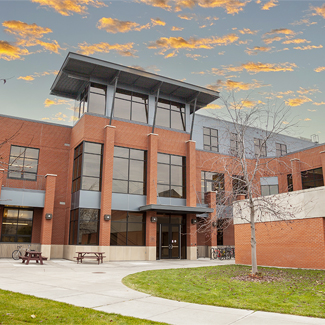40th Public Land Law Conference
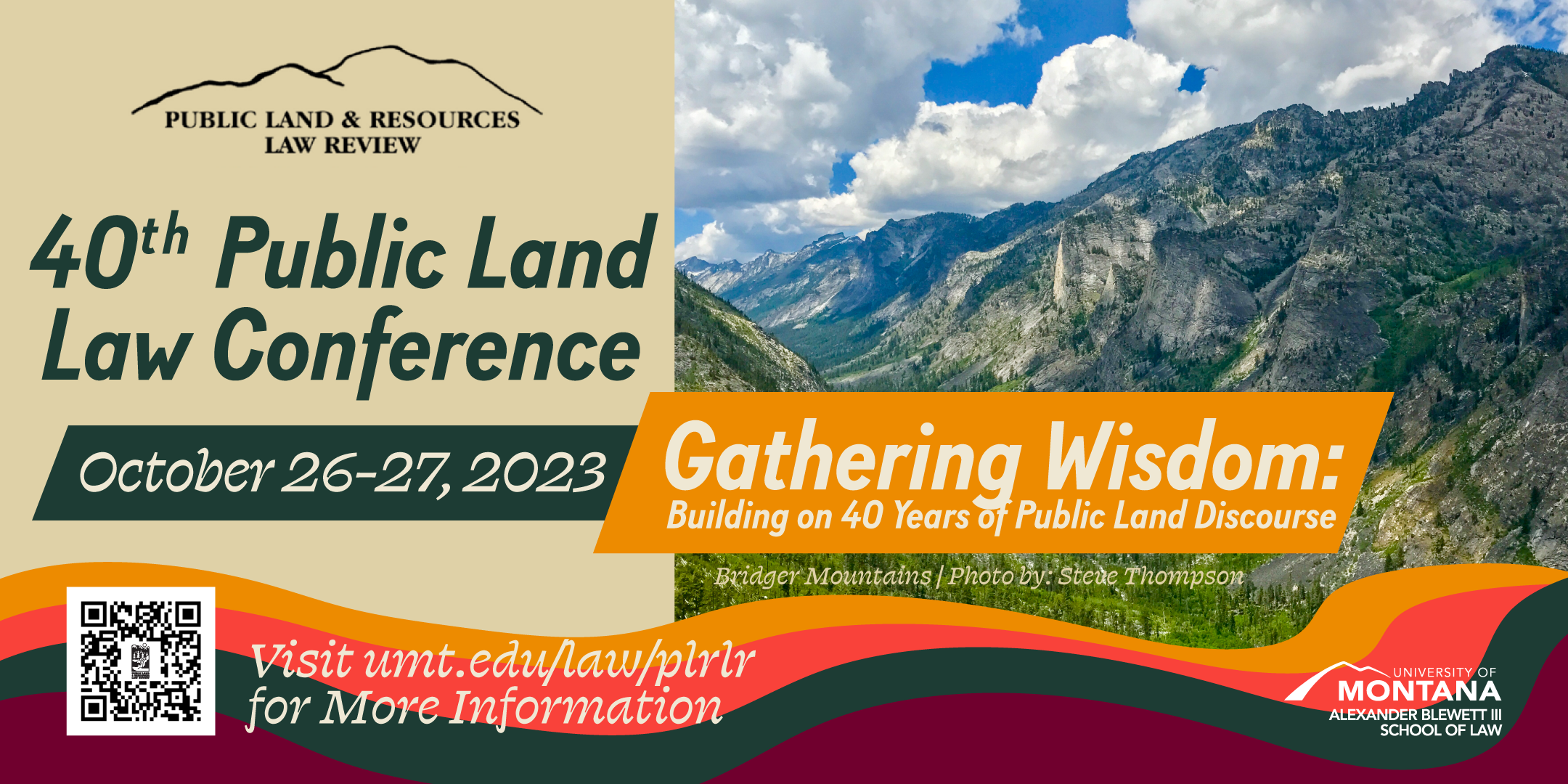
The Public Land & Resources Law Review is excited to announce its 40th Public Land Law Conference, Gathering Wisdom: Building on 40 Years of Public Land Discourse. In the Conference’s 40 years, much has been accomplished in the field of natural resources management on both our public lands and in Indian Country. As with all things, there is still much learning to be done as we face ongoing challenges alongside ones we had not envisioned four decades ago. This conference gathers the bright minds of the field, both seasoned visionaries who presented in past conference years and those approaching this discourse with fresh eyes, to engage in a history-grounded discussion of what we have learned and how we should apply that wisdom to the complex future of public and tribal lands.
Video: Watch This Year's PLLR Conference
Presentation Slides from Conference
Schedule
Thursday, October 26
Registration – 4:30 p.m. - 5:00 p.m.
Evening Keynote & Reception – 5:00 p.m. – 6:00 p.m.
John Leshy, Emeritus Professor of Law at UC Law San Francisco – Our Common Ground: A History of America's Public Lands
Click the below button for a zoom option from on Thursday, October 26, 2023 from 4:30 p.m. The password is 918435.
Friday, October 27
Morning Registration – 8:30 a.m. - 9:00 a.m.
Morning Keynote – 9:00 a.m. - 10:00 a.m.
Nada Culver, Deputy Director, U.S. Bureau of Land Management – Future of Public Lands
Panel 1: The Access Conundrum: Defining "Public," Defining "Rights" – 10:15 a.m. - 11:30 a.m.
Moderator: Professor Kekek Stark
Panelists:
- Martin Nie - Professor of Natural Resource Policy, University of Montana
- Lauren van Schilfgaarde - Assistant Professor of Law, UCLA School of Law
- Garrett Budds - Director of Land Acquisition, American Prairie
As we confront the reality of rising demands on our natural resources, we must find new strategies for sustainable and equitable access to the lands we cherish. This panel examines how the polarization and politicization of public lands have shaped the debate over land use and conservation, the ways in which our lands are being "loved to death," and potential solutions to access such as corner crossing, all while at the same time, protecting spaces of spiritual and cultural importance to tribes.
Noon Address – 12:00 p.m. - 1:00 p.m.
J. Devlan Geddes, Partner, Goetz, Geddes & Gardner P.C. - Future of Public Access in Montana
Panel 2: Everything, Everywhere: Addressing Climate in Public Lands Management – 1:15 p.m. - 2:30 p.m.
Moderator: Professor Sandra Zellmer
Panelists:
- Tom Olliff - Program Manager, National Park Service
- Cathy Whitlock - Professor & Director of the Paleoecology Lab, Montana State University
- Starlyn Miller - Native Lands Partnership Director, The Wilderness Society"
As the climate continues to change, so does the role and scope of public and tribal land management. These lands are undergoing significant climate stressors while also being looked to as essential refuges and spaces for mounting climate responses. How are tribes and public land agencies facing the call to address these realities during planning, collaboration, and decision-making processes?
Panel 3: The Evolution of Water: Imagining a New Future for Aquatic Ecosystems – 2:45 p.m. - 4:00 p.m.
Moderator: Professor Michelle Bryan
Panelists:
- Erin Sexton - Senior Biologist, Flathead Lake Biological Station
- Ada Montague Stepleton - Water Attorney, Native American Rights Fund
- Elaine Harvey - Watershed Department Manager, Columbia River Inter-tribal Commission
This panel explores the role law and policy play in the ecosystem health of our rivers and waterways during a time of climate change and shifting views toward dams. With a focus on the Pacific Northwest and Columbia River Basin, panelists will unpack how our legacy of development and future approaches to waterway management impact the fishery and other aquatic species, also highlighting the important contributions that Native voices and experiences lend to this conversation.
Speaker Bios
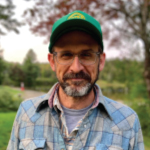 Garrett J. Budds | Director of Land Acquisition | American Prairie
Garrett J. Budds | Director of Land Acquisition | American PrairieGarrett oversees and directs all aspects of American Prairie's land acquisition program, advancing the organization’s goal of assembling the largest nature reserve in the contiguous United States.
He received his undergraduate, graduate, and law degrees from the University of Montana,
where he focused on environmental and natural resource law and policy, and was named to
the inaugural class of Wyss Scholars. Garrett has spent his career in the non-profit conservation space, working to protect land, water, and wildlife at the national, regional, and local scale. In his spare time, he enjoys reading and running, cycling and snowboarding, and
exploring the road less traveled with his wife, kids & dogs.
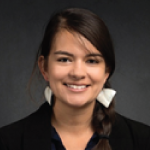
Lauren van Schilfgaarde (Cochiti Pueblo) is Assistant Professor of Law at UCLA School of Law.
Her research focuses on Tribal sovereignty and federal Indian law. She previously was the San
Manuel Band of Mission Indians Tribal Legal Development Clinic Director at UCLA Law wherein
she supervised live-client projects concerning tribal governance and justice systems, ethics,
cultural resource protection, voting, child welfare, and more. She received her undergraduate
degree at Colorado College and her law degree from UCLA School of Law. van Schilfgaarde
previously served as the Tribal Law Specialist at the Tribal Law and Policy Institute (TLPI) in West
Hollywood, CA, focusing primarily on Tribal Healing to Wellness Courts, restorative justice, and
tribal court infrastructure. van Schilfgaarde served as a law clerk for the Native American Rights
Fund and Legal Aid Foundation of Los Angeles. She was a Public Interest Fellow at American Civil
Liberties Union of Colorado. van Schilfgaarde currently serves as co-chair for the Native American Concerns Committee of the American Bar Association and as a board member of the Wishtoyo Chumash Foundation and the AALS Section on Indian Nations & Indigenous Peoples.
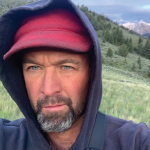 Martin Nie is Professor of Natural Resources Policy and Director of the Bolle Center for People and Forests in the W.A. Franke College of Forestry and Conservation at the University of Montana. His research and teaching focuses on federal public lands and wildlife law, policy and management. He is the author of dozens of scholarly articles, law reviews, two books, and even more applied policy analysis. Central themes of his scholarly work are the challenges and opportunities of managing shared resources that cross boundaries amongst federal, state and tribal sovereign governments. Some of his most recent research and writing focuses on tribal co-management, wildlife conservation on federal lands, and public lands planning. He advises and consults across a broad range of public lands and wildlife issues, especially at the sweet spot where law meets policy and impacts on-the-ground management.
Martin Nie is Professor of Natural Resources Policy and Director of the Bolle Center for People and Forests in the W.A. Franke College of Forestry and Conservation at the University of Montana. His research and teaching focuses on federal public lands and wildlife law, policy and management. He is the author of dozens of scholarly articles, law reviews, two books, and even more applied policy analysis. Central themes of his scholarly work are the challenges and opportunities of managing shared resources that cross boundaries amongst federal, state and tribal sovereign governments. Some of his most recent research and writing focuses on tribal co-management, wildlife conservation on federal lands, and public lands planning. He advises and consults across a broad range of public lands and wildlife issues, especially at the sweet spot where law meets policy and impacts on-the-ground management.
For roughly 25 years, Nie has taught courses in public lands, resources and wildlife policy. He takes particular pride in doing this at UM and in the old “School of Forestry,” a special College with a history of doing influential work. He is a recipient of the University of Montana’s Distinguished Teaching Award, a special recognition based on "a history of excellence in classroom teaching" and given to professors who "have demonstrated a quality long-term impact on their students." Nie is still passionate about teaching public lands and wildlife conservation and takes the greatest joy in watching his former students become leaders in their fields and do such important work.
Nie grew up in Ontario, Canada and received degrees from the University of Nebraska and Northern Arizona University. He loves to ski as much as possible, hunt and hike the mountains of Montana, float wild rivers, live in his wall tent, and mess around in his garage listening to vintage country and rock and roll. He also enjoys playing hockey, Irish whiskey, and strong cheese.
Nie’s research focuses on federal public lands and wildlife policy, law, planning, and management. Some of Nie’s most recent projects and writing examine tribal co-management on federal public lands, the authority to manage fish and wildlife on federal public lands, and various issues related to National Forest management and planning.
(As appointed by the Secretary of Agriculture, Nie served from 2014-2018 on the U.S. Forest Service’s National Advisory Committee for Implementation of the National Forest System Land Management Planning Rule.) Nie’s latest book is The Governance of Western Public Lands: Mapping Its Present and Future (2008).
Martin regularly teaches Natural Resources Policy (NRSM 422), Wildlife Policy (WILD 410) and more specialized policy courses at the graduate level. In 2016, Nie received the University of Montana's Distinguished Teaching Award, a special recognition based on "a history of excellence in classroom teaching" and given to professors who "have demonstrated a quality long-term impact on their students."
Nie grew up in Ontario, Canada and received degrees from the University of Nebraska and Northern Arizona University. He loves to ski as much as possible with his son Joe, float wild rivers; hike, hunt and run the mountains of Montana, and mess around in his garage listening to vintage country and rock and roll. He also enjoys playing hockey, Irish whiskey, and strong cheese.
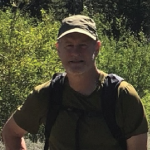 Tom Olliff is the NPS Intermountain Region Chief of Landscape Conservation and Climate Change, working toward better conservation across boundaries in response to climate change and other landscape-level stressors. Tom previously served as the Chief of the Yellowstone Center for Resources, where he managed Yellowstone’s bear, wolf, elk, bison, geology, archeology, and fish programs. Tom spent 32 years living and working in Yellowstone as a park ranger, biologist, EMT, firefighter, and on a backcountry trail crew. He has a B.S. in Forest Management from Auburn University and an M.S. in Resource Conservation from the University of Montana.
Tom Olliff is the NPS Intermountain Region Chief of Landscape Conservation and Climate Change, working toward better conservation across boundaries in response to climate change and other landscape-level stressors. Tom previously served as the Chief of the Yellowstone Center for Resources, where he managed Yellowstone’s bear, wolf, elk, bison, geology, archeology, and fish programs. Tom spent 32 years living and working in Yellowstone as a park ranger, biologist, EMT, firefighter, and on a backcountry trail crew. He has a B.S. in Forest Management from Auburn University and an M.S. in Resource Conservation from the University of Montana.
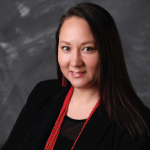 Staryln serves as the Native Lands Partnership Director with The Wilderness Society where she leads a team to develop policy priorities that advance protection of cultural and sacred sites, co-management on public lands, and large landscape protection which center Native and Indigenous peoples history, sovereignty, and interests. Prior to joining The Wilderness Society, Starlyn was the Assistant Tribal Attorney for the Menominee Indian Tribe of Wisconsin. Starlyn also has many years of experience in collaborative work among tribal departments, tribal executive leadership, outside counsel, non-profit partners, media consultants, community groups, tribal, federal, and state agencies on cultural, environmental, and sacred sites. She is a member of the State Bar of Wisconsin and claims title of a “Double Badger” holding a J.D. (2008) from the University of Wisconsin-Madison Law School along with a B.S. in Education from the University of Wisconsin-Madison and certificate in American Indian Studies and Creative Writing (2005). Starlyn is an enrolled member of the Little Shell Chippewa Tribe of Montana and a direct descendant of Menominee and Stockbridge-Munsee.
Staryln serves as the Native Lands Partnership Director with The Wilderness Society where she leads a team to develop policy priorities that advance protection of cultural and sacred sites, co-management on public lands, and large landscape protection which center Native and Indigenous peoples history, sovereignty, and interests. Prior to joining The Wilderness Society, Starlyn was the Assistant Tribal Attorney for the Menominee Indian Tribe of Wisconsin. Starlyn also has many years of experience in collaborative work among tribal departments, tribal executive leadership, outside counsel, non-profit partners, media consultants, community groups, tribal, federal, and state agencies on cultural, environmental, and sacred sites. She is a member of the State Bar of Wisconsin and claims title of a “Double Badger” holding a J.D. (2008) from the University of Wisconsin-Madison Law School along with a B.S. in Education from the University of Wisconsin-Madison and certificate in American Indian Studies and Creative Writing (2005). Starlyn is an enrolled member of the Little Shell Chippewa Tribe of Montana and a direct descendant of Menominee and Stockbridge-Munsee.
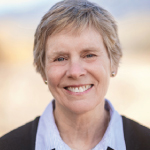
Dr. Cathy Whitlock is a Regents Professor Emerita in Earth Sciences at Montana State University and a Fellow of the Montana Institute on Ecosystems. She is nationally and internationally recognized for her research on the climate and environmental history of Yellowstone and other public lands, as well as for her leadership activities in climate and environmental science. Dr. Whitlock is lead author of the Greater Yellowstone Climate Assessment (2021) and Montana Climate Assessment (2017), which describe the impacts of past and future climate change in the region. She recently shared this information as an expert witness in the Held v. State of Montana case. Dr. Whitlock has received numerous awards and honors from professional societies and organizations, and in 2018, she became the first person from a Montana university to be elected to the National Academy of Sciences.
 Nada Wolff Culver is the Principal Deputy Director of the Bureau of Land Management. Nada most recently served as the Vice President, Public Lands and Senior Policy Counsel at the National Audubon Society. Prior to joining Audubon, Nada was the Senior Counsel and Senior Director for Policy and Planning at The Wilderness Society. Nada began her career in the private sector, working on a variety of environmental issues including energy development and environmental remediation, and was a partner with the law firm of Patton Boggs. She is a graduate of Northwestern University and the University of Pennsylvania School of Law.
Nada Wolff Culver is the Principal Deputy Director of the Bureau of Land Management. Nada most recently served as the Vice President, Public Lands and Senior Policy Counsel at the National Audubon Society. Prior to joining Audubon, Nada was the Senior Counsel and Senior Director for Policy and Planning at The Wilderness Society. Nada began her career in the private sector, working on a variety of environmental issues including energy development and environmental remediation, and was a partner with the law firm of Patton Boggs. She is a graduate of Northwestern University and the University of Pennsylvania School of Law.
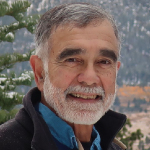 John D. Leshy is a Distinguished Professor Emeritus at the University of California College of the Law in San Francisco (formerly U.C. Hastings). His political history of America’s public lands, Our Common Ground, was published in 2022 by Yale University Press.
John D. Leshy is a Distinguished Professor Emeritus at the University of California College of the Law in San Francisco (formerly U.C. Hastings). His political history of America’s public lands, Our Common Ground, was published in 2022 by Yale University Press.
Leshy was Solicitor (General Counsel) of the Interior Department a Senate-confirmed position) throughout the Clinton Administration. Earlier, he was counsel to the Chair of the Natural Resources Committee of the U.S. House of Representatives, a law professor at Arizona State University, Associate Solicitor of Interior for Energy and Resources in the Carter Administration, an attorney-advocate with the Natural Resources Defense Council (NRDC), and a litigator in the U.S. Department of Justice Civil Rights Division. He headed the Interior Department transition team for Clinton-Gore in 1992 and was co-lead for Obama-Biden in 2008.
Leshy has been a visiting professor multiple times at Harvard Law School, from which he graduated in 1969, after earning an A.B. at Harvard College. He has served on numerous boards and commissions and his many publications include a book on the Mining Law of 1872 and co-authoring casebooks on public land and resources law (now in its 8th edition, 2021) and water law (6th edition, 2018).
 Ada Montague Stepleton joined NARF in 2021 as an attorney with eight years of experience practicing land use and water law in both the private sector and with the Montana Department of Natural Resources and Conservation. Ada comes to NARF with a solid reputation in achieving collaborative outcomes and for exceptional diligence in the practice of law. She earned a law degree from the University of Montana, where she was honored to receive the Margery Hunter Brown fellowship. Concurrent with her law degree, she earned an MS in Environmental Studies, focusing on watershed ecology, and a certificate in natural resources conflict resolution. She also served on the Public Lands and Resources Law Review.
Ada Montague Stepleton joined NARF in 2021 as an attorney with eight years of experience practicing land use and water law in both the private sector and with the Montana Department of Natural Resources and Conservation. Ada comes to NARF with a solid reputation in achieving collaborative outcomes and for exceptional diligence in the practice of law. She earned a law degree from the University of Montana, where she was honored to receive the Margery Hunter Brown fellowship. Concurrent with her law degree, she earned an MS in Environmental Studies, focusing on watershed ecology, and a certificate in natural resources conflict resolution. She also served on the Public Lands and Resources Law Review.
 Elaine Harvey currently works for the Columbia River Inter-Tribal Fish Commission as the Watershed Department Manager and has also previously worked for Yakama Nation Fisheries since 2006. Elaine is also a citizen of the Kamiltpah (Rock Creek) Band of the Yakama Nation. She was the manager for the Rock Creek Fish and Habitat Project for 13 years and served as the Hydro Systems Oversight Coordinator and Environmental Coordinator at the Yakama Nation Fisheries. She was also a Columbia River Inter-Tribal Fisheries Commissioner for the Yakama Nation and serves as an Executive Board member for the Columbia Land Trust.
Elaine Harvey currently works for the Columbia River Inter-Tribal Fish Commission as the Watershed Department Manager and has also previously worked for Yakama Nation Fisheries since 2006. Elaine is also a citizen of the Kamiltpah (Rock Creek) Band of the Yakama Nation. She was the manager for the Rock Creek Fish and Habitat Project for 13 years and served as the Hydro Systems Oversight Coordinator and Environmental Coordinator at the Yakama Nation Fisheries. She was also a Columbia River Inter-Tribal Fisheries Commissioner for the Yakama Nation and serves as an Executive Board member for the Columbia Land Trust.
Elaine dedicates her career to conserving and enhancing the First Foods for the Yakama Nation during a time of warming climate conditions. Her work includes enhancing streams for all native aquatic resources in many streams, riparian corridors, and wetlands in the streams in the Rock Creek, Klickitat, White Salmon, and Yakima drainages. She also actively works with national forests to protect and enhance huckleberry habitats in the various huckleberry fields utilized by the Yakama Nation. Elaine works with her tribal departments to improve root gathering areas for tribal members on the Yakama reservation. She also is dedicated to sharing her traditional knowledge with the younger generations of the Yakama Nation.
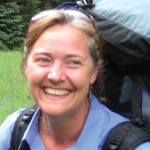 As a Senior Scientist with the University of Montana, Flathead Lake Biological Station, Erin works at the interface of science and policy to ensure that sound science informs environmental decision-making, in the large landscapes and transboundary rivers of Western North America. She enjoys working in collaborative teams, across borders, across disciplines and across ways of knowing. Erin’s research focuses on the complex and far-reaching impacts of legacy and proposed mining in transboundary watersheds and Indigenous lands in Montana, Idaho, Alaska and British Columbia.
As a Senior Scientist with the University of Montana, Flathead Lake Biological Station, Erin works at the interface of science and policy to ensure that sound science informs environmental decision-making, in the large landscapes and transboundary rivers of Western North America. She enjoys working in collaborative teams, across borders, across disciplines and across ways of knowing. Erin’s research focuses on the complex and far-reaching impacts of legacy and proposed mining in transboundary watersheds and Indigenous lands in Montana, Idaho, Alaska and British Columbia.
 Devlan grew up in Junction City, Oregon. He moved to Montana in 1992 to attend Montana State University to play football. Devlan then attended law school at the University of Oregon in Eugene. He served as the Editor-in-Chief of the Oregon Law Review and was selected as a member of the Order of the Coif for high academic achievement.
Devlan grew up in Junction City, Oregon. He moved to Montana in 1992 to attend Montana State University to play football. Devlan then attended law school at the University of Oregon in Eugene. He served as the Editor-in-Chief of the Oregon Law Review and was selected as a member of the Order of the Coif for high academic achievement.
After law school, Devlan started his legal career at Preston, Gates & Ellis (now K&L Gates) in Seattle, Washington. Devlan’s practice in Seattle focused primarily on intellectual property and commercial litigation. In 2002, Devlan returned to Bozeman to join Goetz, Geddes & Gardner P.C. Devlan quickly developed a broad-based practice representing both plaintiffs and defendants in complex litigation matters. Devlan is considered to be leading the charge in Montana to preserve access to public land, rivers, and lakes through his representation of Public Lands/Water Access Association, Inc.
In Memory
 Nicole “Nikki” Elise Ducheneaux, 44, a Cheyenne River Lakota lawyer, walked on July 14, 2023. She was a member of the Cheyenne River Sioux Tribe and a first-generation descendant of the Confederated Salish and Kootenai Tribes of the Flathead Reservation. After she finished law school, she was selected for a clerkship with the Montana State Supreme Court. Nikki then began her advocacy career by representing folks in Montana as a public defender, where she was known to be the “biggest and brightest star.” She then moved on to her true calling: defending Tribal Sovereignty and Jurisdiction, as a formidable and innovative litigator.
Nicole “Nikki” Elise Ducheneaux, 44, a Cheyenne River Lakota lawyer, walked on July 14, 2023. She was a member of the Cheyenne River Sioux Tribe and a first-generation descendant of the Confederated Salish and Kootenai Tribes of the Flathead Reservation. After she finished law school, she was selected for a clerkship with the Montana State Supreme Court. Nikki then began her advocacy career by representing folks in Montana as a public defender, where she was known to be the “biggest and brightest star.” She then moved on to her true calling: defending Tribal Sovereignty and Jurisdiction, as a formidable and innovative litigator.
Nikki advocated for Tribes and Tribal entities in courts across the United States, including state, tribal, and federal courts, and appellate courts of all varieties, including the United States Supreme Court. She joined Fredericks Peebles & Morgan as an associate in 2012, where she quickly rose in the ranks to become a litigation partner by 2015. In 2016, Nikki was honored by the National Center for American Indian Enterprise Development as one of the 2016 Native American 40 under 40 awardees.
In 2019, she was one of the founding equity partners of Big Fire Law and Policy Group as the head of litigation, where she established a reputation for tireless and passionate advocacy. As a founding equity partner, Nikki was constantly focused on the best interests of the Firm. But beyond her work, she was also a devoted and loving mother who always made time for her children, to support them in their activities, and passions.
She was a 2007 graduate of the University of Montana School of Law and a strong supporter of our students and the Public Land & Resources Law Review, where she generously gave of her time as a conference speaker.
 Charles Wilkinson was the the Moses Lasky Professor of Law Emeritus and Distinguished Professor at the University of Colorado Law School and the Getches-Wilkinson Center. Wilkinson passed away surrounded by family on Tuesday, June 6, 2023.
Charles Wilkinson was the the Moses Lasky Professor of Law Emeritus and Distinguished Professor at the University of Colorado Law School and the Getches-Wilkinson Center. Wilkinson passed away surrounded by family on Tuesday, June 6, 2023.
After graduating from Stanford Law School and practicing with prestigious firms in Phoenix and San Francisco, Wilkinson embarked on a remarkable career that encompassed teaching, writing, and advocating for the rights of Indigenous Peoples and the environment. In 1971, he joined the newly formed Native American Rights Fund in Boulder, Colorado as a staff attorney, helping to shape the organization’s pathbreaking advocacy for Tribes. Together with the late Dean David Getches, Professor Richard Collins, and NARF Executive Director John Echohawk, Wilkinson helped to secure landmark victories in tribal treaty rights litigation and establish a relationship between Colorado Law and NARF that endures to this day.
Wilkinson was a passionate and inventive teacher and mentor, educating and inspiring thousands of students and scores of colleagues at law schools throughout the country. As his colleagues and students would attest, Wilkinson left an indelible mark, not just on legal education and scholarship, but on those attributes that are the very essence of the American West.
Most of Wilkinson's teaching career was spent at the Oregon and Colorado law schools, where his influence and impact were deeply felt. In 1997, the regents of the University of Colorado recognized Wilkinson as a Distinguished Professor, one of only twenty-five at the University. His gift for teaching and deep commitment to research were repeatedly acknowledged through numerous teaching and research awards throughout his illustrious career. Wilkinson was famous for hiring law students as research assistants and sending them out in the world to learn about legal problems. These opportunities were often life-changing, with dozens of his students going on to practice Indian Law and Public Land Law over the decades.
As a prolific writer, Wilkinson authored fourteen books, which stand as seminal works that shaped the fields of Indian Law and Federal Public Land Law. These include highly regarded casebooks and general audience books, including Crossing the Next Meridian, that tackled pressing issues related to land, water, the West, Indigenous rights, and the complex histories that shape our nation. His writings, marked by their clarity and profound insights, resonated with scholars, practitioners, and the general public, making him an influential voice in legal and environmental discourse. He was an early thought leader in the field of environmental justice, seeing early on that the rights of Native Americans had to be considered at the heart of public lands and conservation policy.
Beyond the classroom, the written word, his work with tribes, and support for students, Wilkinson devoted himself to numerous special assignments for the U.S. Departments of Interior, Agriculture, and Justice. His expertise was sought after, and he played instrumental roles in critical negotiations and policy development. From facilitating agreements between the Timbisha Shoshone Tribe and the National Park Service to serving as a special advisor for the creation of Grand Staircase-Escalante National Monument and Bears Ears National Monument, Wilkinson's successes extended far beyond the confines of academia.
Charles Wilkinson's exceptional achievements were recognized through a multitude of prestigious awards and honors. These accolades include the National Wildlife Federation's National Conservation Award, which acknowledged his unwavering commitment to the preservation of our natural heritage. The Earle A. Chiles Award from the Oregon High Desert Museum celebrated his career-long dedication to the High Desert region, while the Twanat Award from the Warm Springs Museum recognized his tireless work in support of Indian people.
Professor Wilkinson was a dear friend of Professor Margery Hunter Brown, who helped start the Public Land & Resources Law Review, and supported the journal throughout the years by publishing articles and speaking at its conferences. A force in natural resource scholarship, a tribal advocate and leading Indian law scholar, and a mentor to countless students and faculty, Mr. Wilkinson’s loss is felt deeply throughout the nation.
